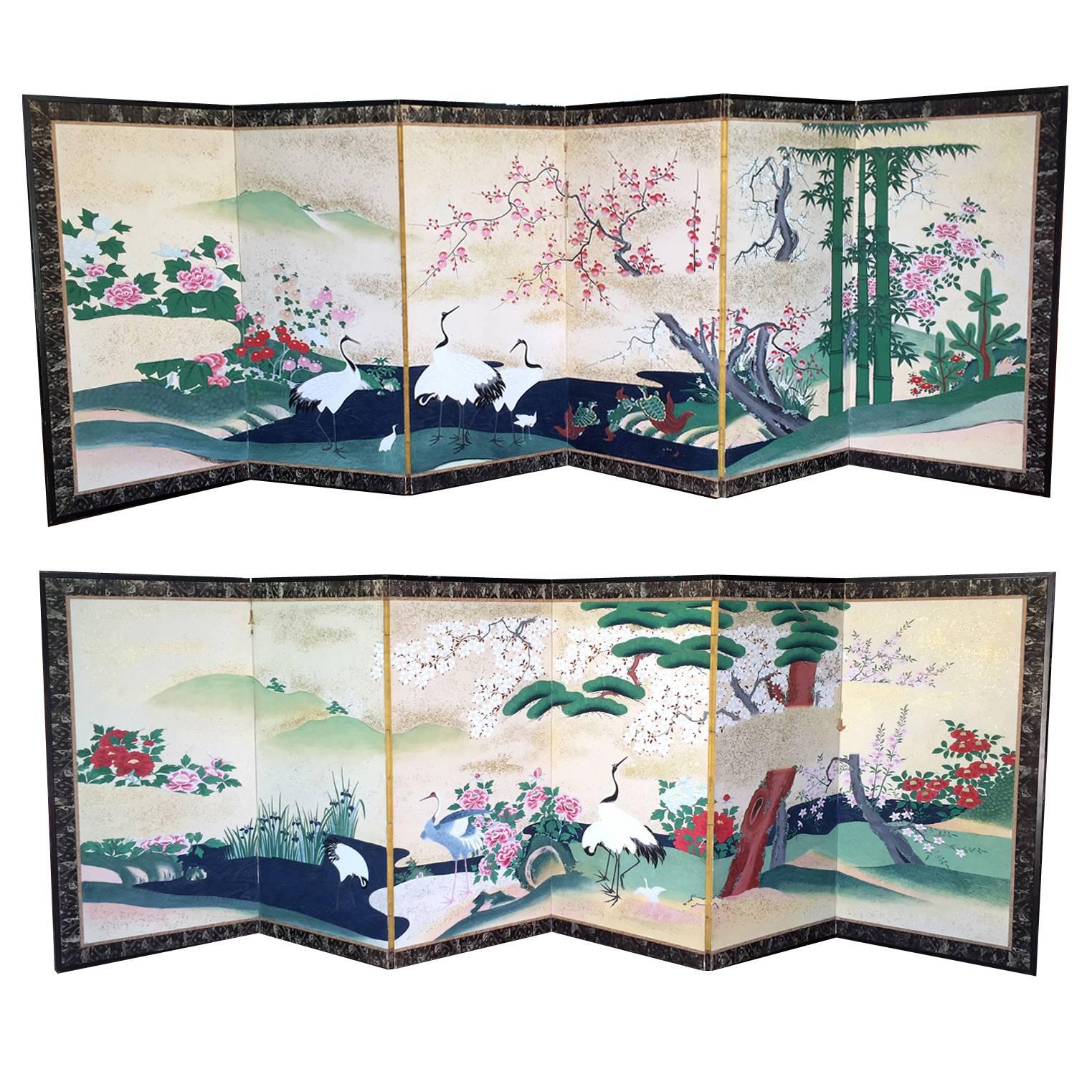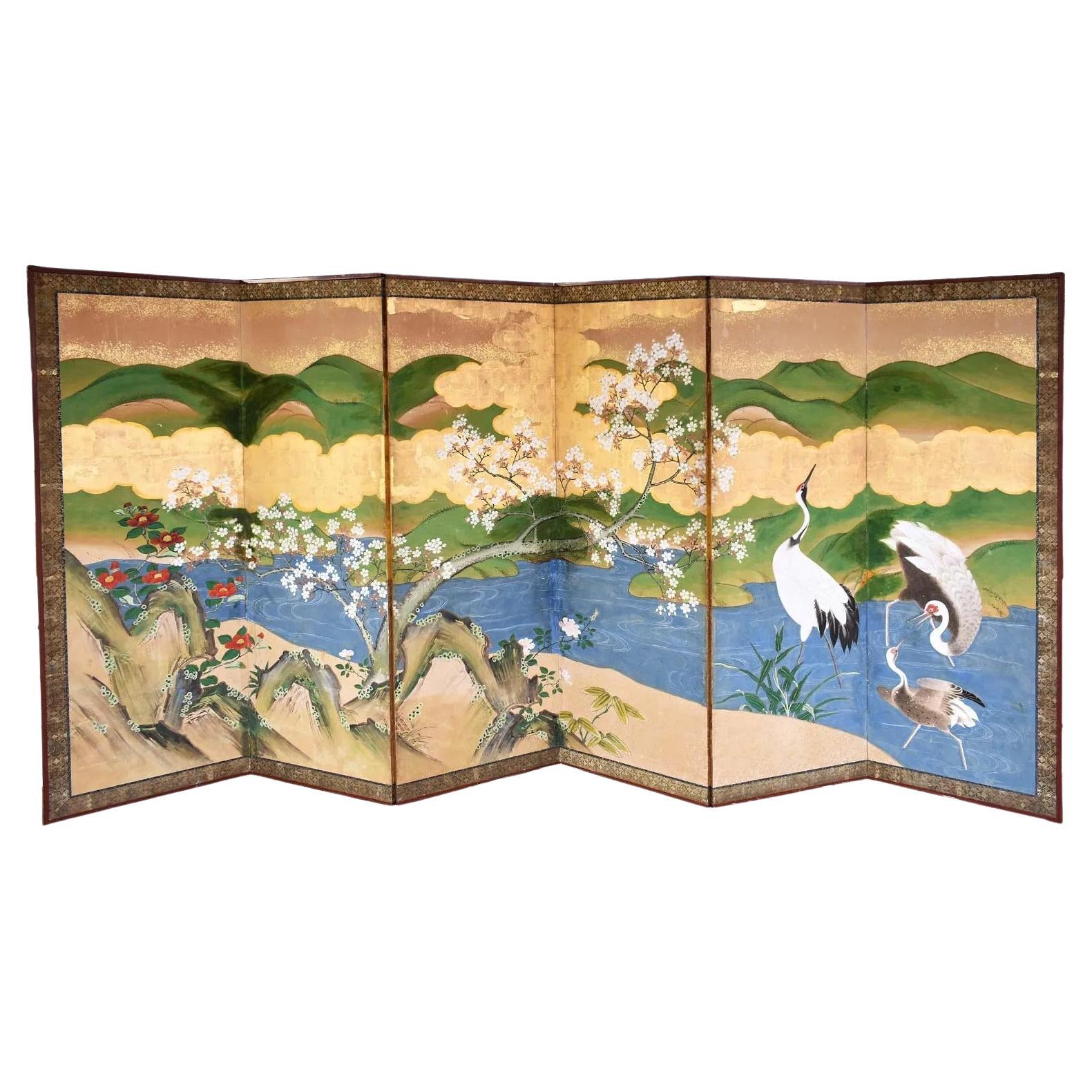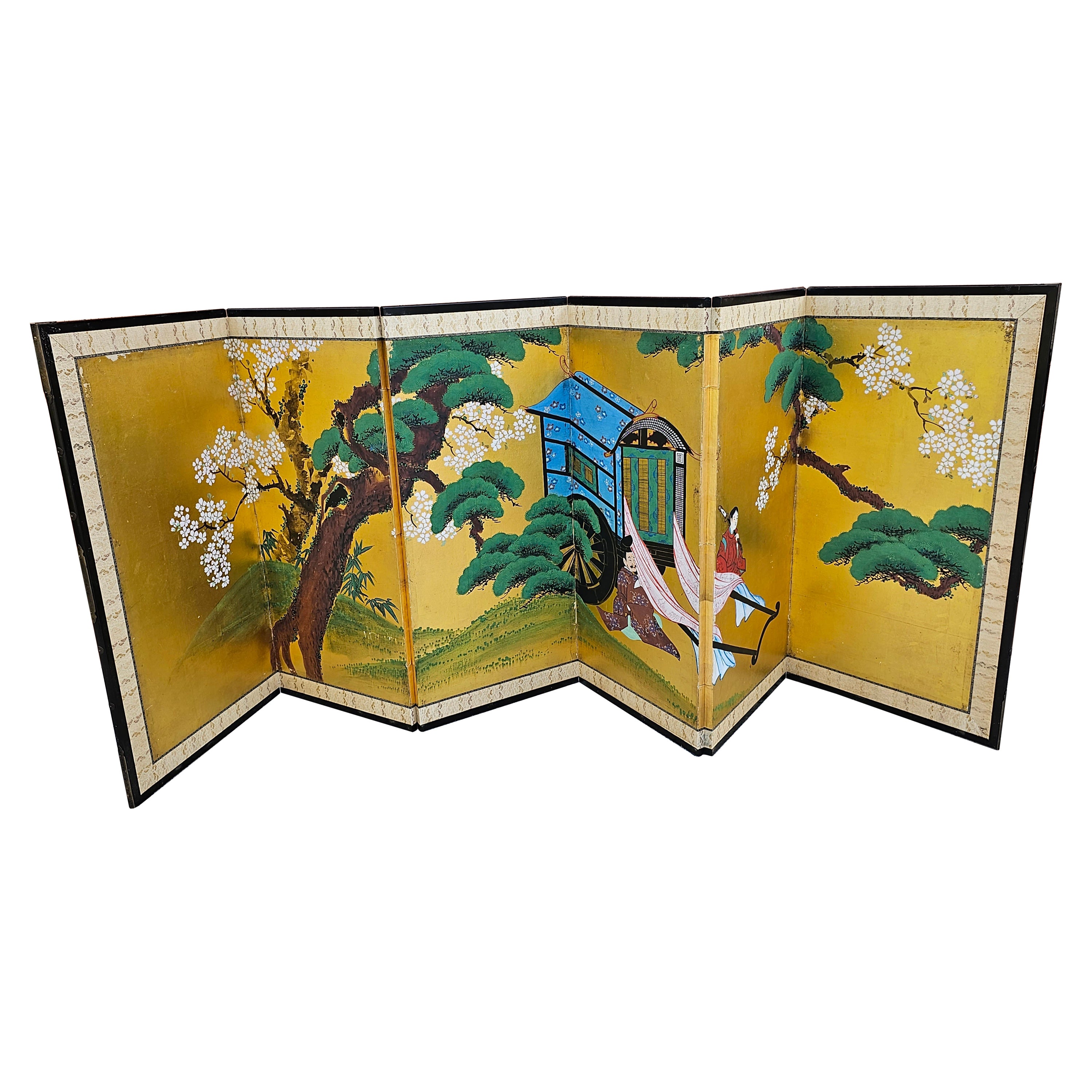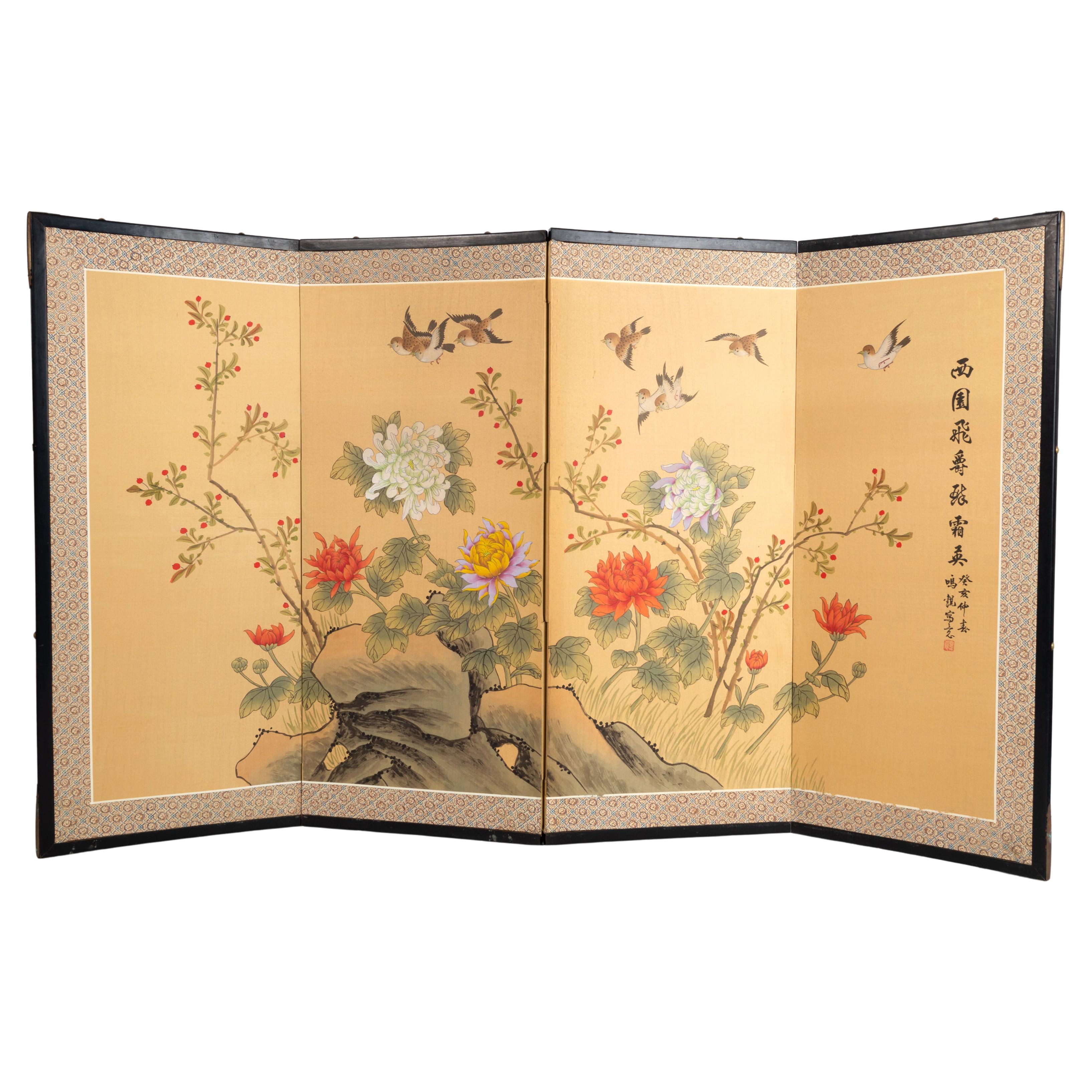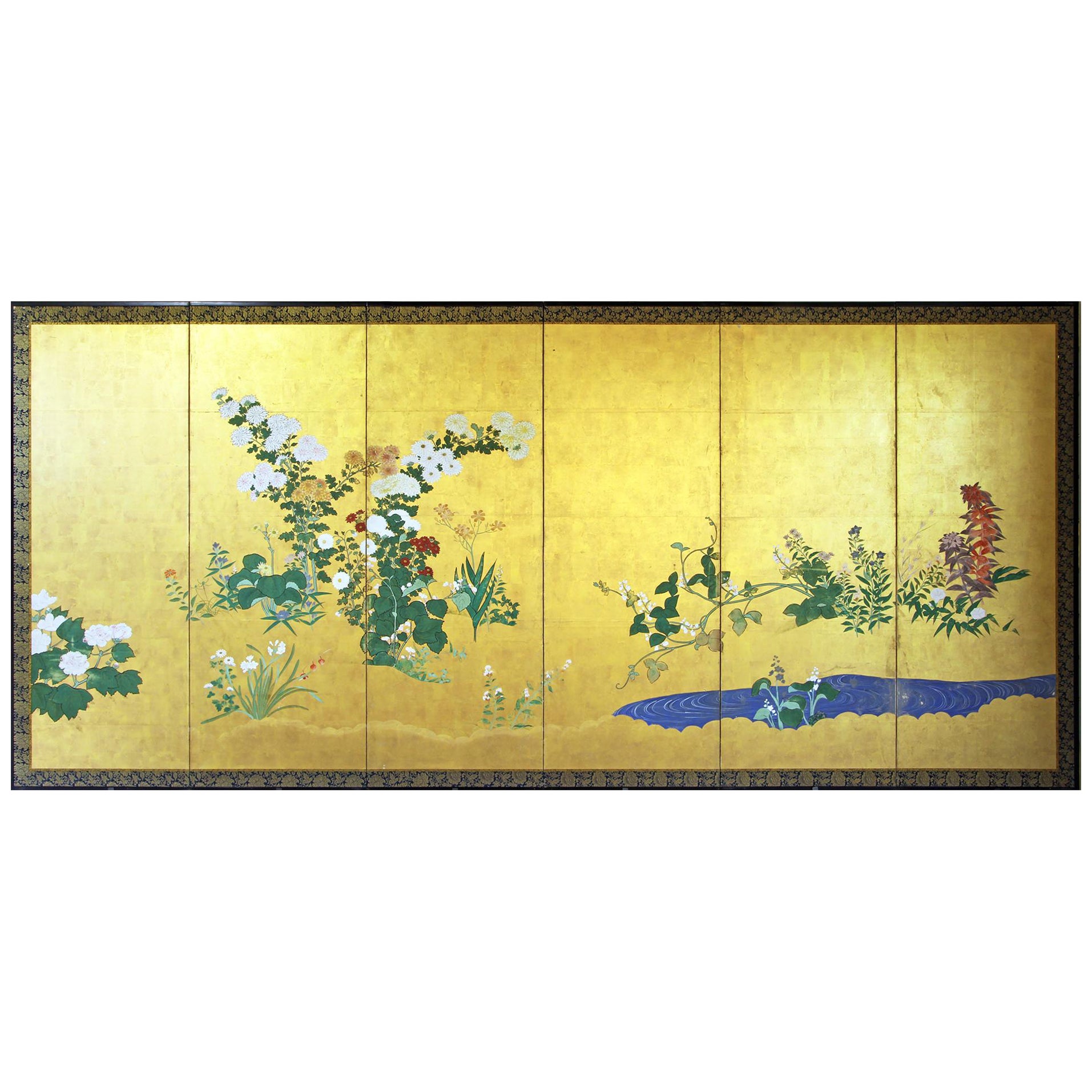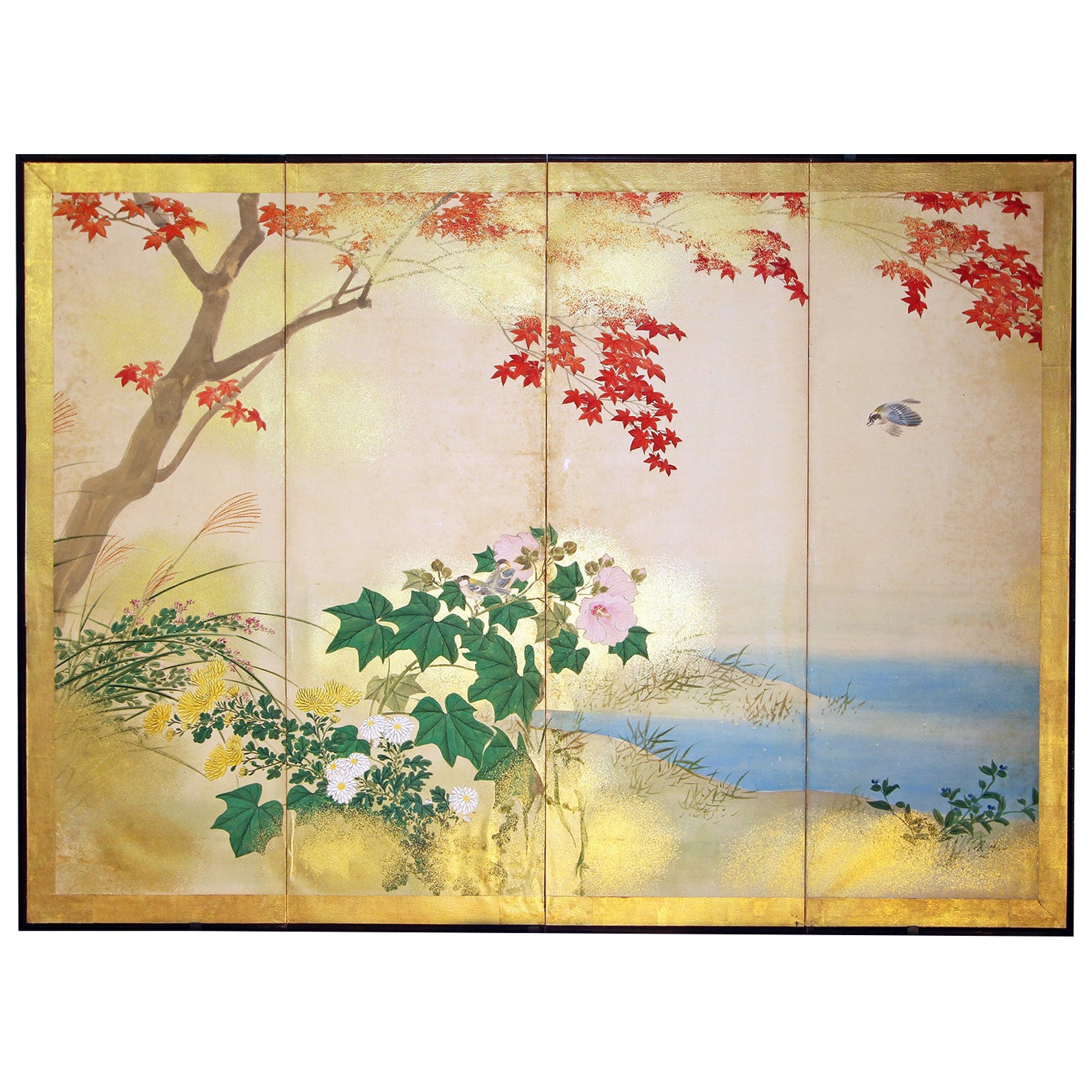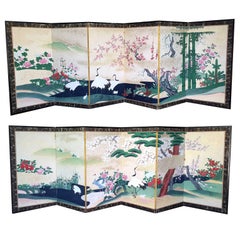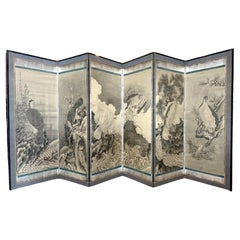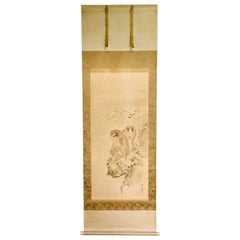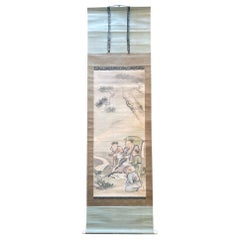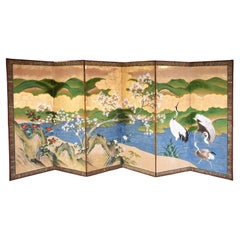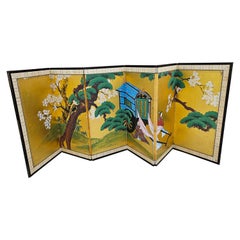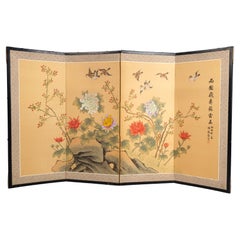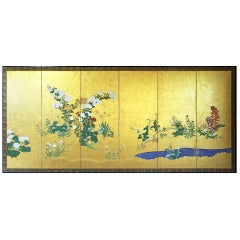Items Similar to Rare Antique Japanese Folding Screen by Kano Tanshin
Want more images or videos?
Request additional images or videos from the seller
1 of 11
Rare Antique Japanese Folding Screen by Kano Tanshin
$40,000
£29,681.55
€34,574.94
CA$55,680.29
A$62,005.02
CHF 32,270.19
MX$764,514.48
NOK 410,985.54
SEK 386,286.57
DKK 257,971.95
Shipping
Retrieving quote...The 1stDibs Promise:
Authenticity Guarantee,
Money-Back Guarantee,
24-Hour Cancellation
About the Item
An exquisite Japanese folding screen painted and signed by Kano Tanshin (Morimasa) (1658-1719), circa early Edo Period. An important member of the Kano painter family, the son of Kano Tanyu by his second wife, Kano Tanshin led the Kajibashi branch of the Kano school after 1674.
The screen consists of six fully mounted panels depicts a lively family garden scene with men and children at a leisure play. Mountain, rivers and trees serve as the stage with the gold dust-splashed background. This work is extraordinary both its meticulous artistry and superb condition. It was originally purchased in the early 1970s from the Yatsuhashi Inc, a pioneer Japanese antique and art gallery founded by influential art dealer Harumichi Yatsuhashi (1886-1982) in 1945 in the Beacon Hill, Boston. The work comes with an authentication and appraisal letter written and signed by Harumichi Yatuhashi dated to 1976.
One of the most famous schools of Japanese painting, the Kano¯ school of was the dominant style of painting from the late 15th century until the Meiji period when it further branched into sub-schools. Kano school was rooted in the Chinese literati style painting that focuses on brush strokes but took a firm Japanese identity.
- Creator:Kano Tanshin (Artist)
- Dimensions:Height: 38.25 in (97.16 cm)Width: 112 in (284.48 cm)Depth: 1 in (2.54 cm)
- Style:Japonisme (Of the Period)
- Materials and Techniques:
- Place of Origin:
- Period:
- Date of Manufacture:17th Century-Early 18th Century
- Condition:Wear consistent with age and use. Very fine antique condition with a couple of minor abrasion and pin holes on the pigment. Rubbings on the backing gold patterned paper. Likely remounted some time in the early 20th century.
- Seller Location:Atlanta, GA
- Reference Number:1stDibs: LU94504562953
About the Seller
4.9
Platinum Seller
Premium sellers with a 4.7+ rating and 24-hour response times
Established in 2006
1stDibs seller since 2010
561 sales on 1stDibs
Typical response time: <1 hour
- ShippingRetrieving quote...Shipping from: Atlanta, GA
- Return Policy
Authenticity Guarantee
In the unlikely event there’s an issue with an item’s authenticity, contact us within 1 year for a full refund. DetailsMoney-Back Guarantee
If your item is not as described, is damaged in transit, or does not arrive, contact us within 7 days for a full refund. Details24-Hour Cancellation
You have a 24-hour grace period in which to reconsider your purchase, with no questions asked.Vetted Professional Sellers
Our world-class sellers must adhere to strict standards for service and quality, maintaining the integrity of our listings.Price-Match Guarantee
If you find that a seller listed the same item for a lower price elsewhere, we’ll match it.Trusted Global Delivery
Our best-in-class carrier network provides specialized shipping options worldwide, including custom delivery.More From This Seller
View AllPair of Rare Antique Japanese Folding Screens with Provenance
Located in Atlanta, GA
An amazing pair of matching antique Japanese folding screen predating 1812-1813, most likely from Kano School. Six panels each depict C...
Category
Antique 1810s Japanese Japonisme Paintings and Screens
Materials
Brass
Rare Japanese Floor Screen of Perched Eagles Soga Shohaku Edo period
Located in Atlanta, GA
A rare six-panel Japanese folding floor screen (Byōbu) by Soga Shōhaku (1730-1781) from Edo period. The screen depicts six perched hawk-eagles in various poses positioned in a litera...
Category
Antique 18th Century Japanese Edo Paintings and Screens
Materials
Brocade, Wood, Paper
Japanese Silk Scroll Painting of Moneys Edo Period Mori Tetsuzan
Located in Atlanta, GA
A Japanese mounted vertical hanging scroll painting by Mori Tetsuzan (Japanese, 1775-1841) circa 19th century Edo period. The watercolor and ink on silk ...
Category
Antique 19th Century Japanese Japonisme Paintings and Screens
Materials
Silk, Paper
Japanese Silk Scroll by Haruki Nanmei Edo Period
Located in Atlanta, GA
A Japanese hanging silk scroll by late Edo period painter Haruki Nanmei (1795-1878). The gouache painting was in the tradition of Kano school and depicts an old scholar dressed in lo...
Category
Antique 19th Century Japanese Edo Paintings and Screens
Materials
Silk, Paper
Japanese Antique Fukusa Textile Art Meiji Period
Located in Atlanta, GA
A Japanese silk Fukusa panel circa late 19th-early 20th century of Meiji Period. The front was beautifully decorated with Yuzen-zome, a labor intensive resist-dye technique invested by an artist monk Miyazaki Yuzensai (1654 -1736) of Edo period. The front cover likely depicts a scene from the Tale of Genji, showing a nobleman and his servant pays a visit to a lady in a fenced thatch-roof house under a high peak. The details of blossom trees and pines, as well as the characters, and scenery with a gradual color are astounding. It is telling that the Yuzen dying was used such an mastery.
The piece has a red silk backing and still retains two red tassels on the lower corners as well as decorative stitches along the edges. There is a patched design on the back likely a Mon symbol (family crest).
Fukusa is a traditional Japanese textile...
Category
Early 20th Century Japanese Japonisme Textiles
Materials
Silk
Antique Japanese Hanging Scroll Attributed to Iwasa Matabei
Located in Atlanta, GA
An antique ink and color on paper hanging scroll (kakejiku) with brocade border. It appears to be a fragment of a larger hand scroll depicting a procession of a lord with his entoura...
Category
Antique Early 17th Century Japanese Japonisme Paintings and Screens
Materials
Silk, Paper
You May Also Like
Vintage Meiji Period Six Panel Japanese Folding Screen
Located in Locust Valley, NY
A super chic and beautifully done Vintage Meiji Period Six Panel Japanese Folding Screen Depicting Cranes in Continuous Landscape With Blossoming Foliage...
Category
Antique Late 19th Century Unknown Meiji Paintings and Screens
Materials
Brass
East Asian Extra Wide Folding Low Six Panel Landscape Divider Screen
Located in Germantown, MD
A 95 inches East Asian Extra Wide Folding Low Six Panel Landscape Divider Screen with beautiful landscape scenes.
Measures 95" in width, 33" in height and 1" thick.
Category
Mid-20th Century Japanese Anglo-Japanese Paintings and Screens
Materials
Metal
Japanese Four-Panel Folding Screen Byobu Signed Showa Period C.1950
Located in London, GB
A four-panel Japanese Byobu folding screen depicting a floral scene with birds.
Japan, C.1950 Showa Period
An attractive example, beautifully h...
Category
Mid-20th Century Japanese Showa Paintings and Screens
Materials
Silk, Paper
Edo Landscape Japanese Folding Screen
By Japanese Studio
Located in Brescia, IT
Refined work by a painter from the first half of the 19th century, from the landscape of the "Rinpa" school by a painter from the end of the 18th century, the Rinpa school.
Six panels painted in ink on gold leaf and "gofun" on vegetable paper.
The flowers are made with the "gofun" technique, natural or pigmented white oyster powder.
Rinpa is one of the major historical schools of Japanese painting. The style was consolidated by the brothers Ogata Korin (1658–1716) and Ogata Kenzan (1663–1743).
This folding screen has a very clean design that leaves plenty of room for the beautiful golden landscape.
It comes flat and you can easily hang it with our hooks.
Lucio Morini...
Category
Antique 18th Century Japanese Edo Paintings and Screens
Materials
Gold Leaf
Byobu - Japanese Folding Screen
By Japanese Studio
Located in Brescia, IT
Nice four-panel Japanese screen painted on vegetal paper, depicting a landscape with a red maple, flowers and birds.
The size is very refined and easy to place in a design project.
Category
Mid-20th Century Japanese Showa Paintings and Screens
Materials
Paper
20th Century Japanese Six Panel River Screen
Located in Locust Valley, NY
This 20th Century Japanese Six-Panel River Screen is a beautiful example of traditional Japanese screen art, featuring a serene river scene. These ...
Category
20th Century Unknown Anglo-Japanese Paintings and Screens
Materials
Wood, Paper
More Ways To Browse
Antique Folding Screen
18th Century Asia Brass
Japanese Brush Painting
Korean Chaekgeori
Retro Thai Temple Rubbings
Sakai Hoitsu
Shibata Zeshin
6 Panel Screen With Cranes
Chinese Screen Gold Gods
Coromandel 4 Panel Screen
Japanese Badger
Japanese Fox Screen
Japanese Screen Owl
Japanese Vintage 2 Panel Screen
Korean 8 Panel Screen
Mori Sosen
Mughal Painting On Cloth
Omega Statue
